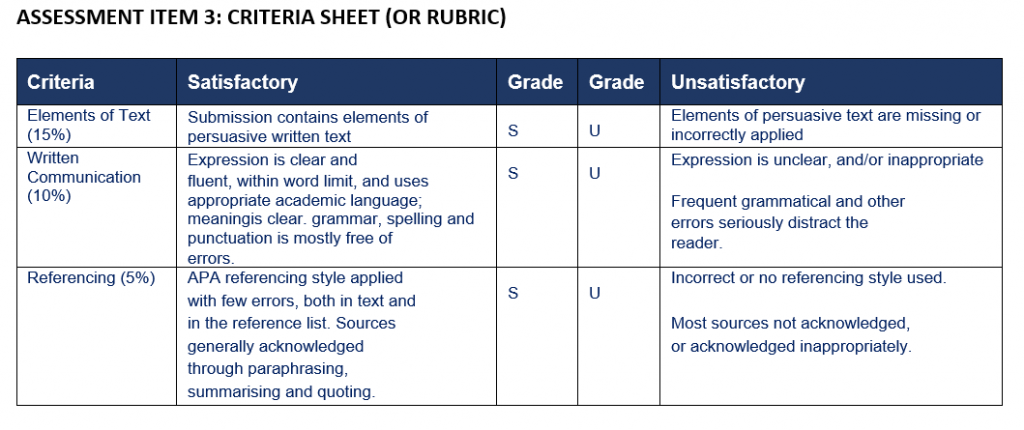4.1: Managing Assessment
- Page ID
- 133158

Introduction
It is not unusual to feel confused or overwhelmed when encountering assessment at university. This chapter is designed to guide you through the process of assessment management and provide strategies to make preparing for assessment as stress free as possible.
We start by discussing the information you receive about your assessment items and what to do with that information. It is important to know exactly what your requirements are before beginning to research or write. Spending a little extra time at the start, analysing your question thoroughly and reading your criteria sheet, will make the assignment research and writing processes easier, and will save you time in the long run.
The next section covers assessment planning. We discuss key components of assessment preparation, including finding information, writing, revising, and submitting your assessments.
We then briefly discuss academic integrity and what it means for university students before concluding the chapter and providing some key points on managing your assessments.
Understanding your Assessment Task
It can be tempting to skip over reading the assessment information and planning. However, these steps will save you time in the long run. Knowing exactly what the task requires you to do and say will ensure that your activities are focused on what is required for the task.
Task Sheets
In your subject outline, you will find assessment tasks with detailed descriptions, and rubrics – more on these later. The descriptor provides information about your assessment task. It is important to read this carefully to undertake your assessment, as it includes essential details that you must address.
| Topic words | These are words and concepts you have to research. |
| Task words | These will tell you how to approach the assignment and structure the information you find in your research (e.g., discuss, analyse). |
| Limiting words | These words define the scope or parameters of the assignment, e.g. Australian perspectives, a particular jurisdiction (this would be relevant then to which laws, codes or standards you consulted), or a timeframe. |
Assessment vocabulary gives you clear direction on exactly what to do. Below is an example of an assessment task you may receive. Notice the use of topic words (coloured orange), limiting words (coloured blue) and task or directive words (coloured green). Consider what a topic and task analysis look like in this example question.
Discuss the suggestion that a wide range of skills are required to succeed in the professional workplace. Consider this in an Australian context.
Conducting a topic analysis is important to develop effective, targeted key words to search for assignment resources. You can then use these words and their synonyms to start looking for good quality information which is relevant to your topic (see the Working with Information chapter for more about finding information). View the video on Boolean operators below for more information.
There are a range of different assessment types you may be asked to complete (e.g. essay, report, or presentation). For more information, visit Types of Assignments.
Written assessment word count
The word count, or word length, is an important piece of information as it provides a guide to the overall size of the task. The word count indicates the number of words required to adequately address the assessment task. At JCU, a general rule is you have a 10% leeway above or below the stated word count (it is recommended to check with your lecturer or tutor). For more information see the English Language Foundations chapter about writing concisely.
Word count considerations
Things to check regarding the word count include:
- What is the penalty for going over the word limit (sometimes markers will only review your writing up to the word limit, or you may lose marks for going over the limit)?
- Does the word count include in-text citations and the reference list?
- Does the word count include figures, tables, and appendices?
How many and what kind of references do you need to include in your assignments?
The number, type, and publication date of references refers to the acceptable sources of information that you reference in your work. The chapter Working with Information provides guidance about finding, evaluating, and managing sources of information.
Marking Rubric
The marking rubric provides an overview of each marked component of the assessment task and can be helpful in the planning, writing, and reviewing phase of your assessment process. The marking rubric will help you to understand more precisely what your marker will be looking for when marking your assignment. Figure 16.2 shows an extract from a marking rubric, where the assessment task was to write an essay outlining typical and atypical development for a chosen developmental period.

The marking rubric is also useful when you are reviewing your work prior to submission. You can use the rubric as a checklist to ensure that you have included all the key pieces of information.
Assessment Weighting
The weighting of an assessment item refers to the amount, or proportion, that each assessment mark contributes to your final grade. While you should never ignore low weighted assessment tasks, the weighting should guide the amount of time you invest in an individual assessment task.
| Assessment item | Weighting |
| Annotated Bibliography | 5% |
| Essay | 25% |
| Short answer quiz | 10% |
| Presentation | 20% |
| End of semester exam | 40% |
| 100% |
Planning
Once you have understood the requirements of your assessment task, writing a plan will assist you to:
- Break the task into manageable chunks.
- Keep your assessment study time focused on what you need to be achieving.
- Keep to your word limit.
The chapter Time Management provides useful information about breaking larger tasks into smaller ones and managing your study time. Be sure to pay attention to the information about chunking your task.
Finding information

You are usually going to need to find credible information once you understand the requirements of the assessment task. The chapter Working with Information provides guidance on finding and managing information. Remember to keep the reference information with any notes that you are taking, so you can appropriately cite this information.
Writing your assignment
You are now ready to write your assessment. Remember to refer to your original assessment plan, including which key points you will be making.
The English Language Foundations chapter provides information about enhancing your writing and the Types of Assignments chapter provides additional information about writing specific sections and types of assignments. If you are preparing a presentation, then the Presentations chapter will be a useful guide.
Revising and reviewing
Allocate time for revising and reviewing your work before submitting. This allows you to find and fix small errors that could lose you marks. It is also an opportunity to review your document as a whole to ensure that your ideas are fully explained and linked to the assessment task. If possible, leave your writing for a couple of days before you start reviewing, editing, and proofreading. This will allow you to see your work with ‘fresh eyes’ and you will be more likely to detect errors and inconsistencies. Review each of your sentences (e.g. correct punctuation, length, and spelling), paragraphs (e.g. clear topic sentences and credible appropriately cited evidence), and the document as a whole. You can also use the information from the English Language Foundations chapter as a guide when reviewing your writing.
The marking rubric and task sheet can also be used as checklists to ensure that you have covered all the key aspects required for the assessment task. For example, check that you have:
- used the correct referencing style
- cited the required number of credible sources (if specified)
- provided information on each of the required topics
- used the required headings and formatting
- written within the required word count
The English Language Foundations chapter also provides useful information about enhancing your writing and the Types of Assignments chapter provides additional information about writing specific sections and types of assignments.
Submitting
Don’t forget to submit your assessment. At JCU, this is usually done through a drop box in your LearnJCU subject site. Check that your submission has gone through if you are submitting online and keep a copy of any assessments once submitted.
Preparing for feedback

At university, staff and your peers provide you with verbal and written feedback to help you learn and develop. However, this feedback can only be effective if you are prepared to receive it. In practice, this means you need to do the following:
- Keep an open mind: The person who provides you with feedback may be critical of your work or your views. This criticism is an important feature of learning at tertiary level. It is meant to be constructive, not personal. Be prepared to accept this criticism.
- Be reflective: To ensure that you are ready to use feedback, adopt a reflective mindset. This means reading or listening to comments and thinking about how you may use this information to improve your work.
- Get ready to change: Feedback is only effective if it is used. This means that you need to be prepared to act or change how you perform a task or engage in an activity in response to feedback. If you are unwilling to make changes, you limit the positive impact feedback can have.
Engaging with feedback
Once you have received feedback in class, online, in practicals, or on a piece of assessment, you need to engage and act on it. This means you need to allow yourself time to review, think about, clarify, and apply feedback to your current and future work. As engaging with your feedback is part of the learning process, use your feedback to:
- Improve your work and/or practice
- Develop your skills
- Improve your marks
If you don’t consider your feedback, then you may continue to lose marks or make the same mistakes in future assessments or tasks. Feedback is an ongoing process and includes:
- Constructive feedback on areas for improvement during your studies.
- Feedback about your work. It is not about you as a person (try not to take it personally).
Hints and tips for using feedback
There are several strategies you can utilise to take advantage of your feedback. Remember, sometimes it helps to read through your feedback, then leave it for a while before engaging with it. Consider:
- What you did well.
- What can you improve for your next assessment.
- What information or support you will need to develop those skills.
- What areas did you receive partial or no marks for? These are areas for improvement.
Dealing with negative feedback
We all make mistakes and have areas for improvement. Therefore, try not to be too hard on yourself. Put your feedback in perspective and remember, it’s not personal. Importantly, use your feedback to your advantage and learn from it. Last but not least, ask for help. There are resources and people available to help you engage with your feedback and improve your skills.
Key resources at JCU include: your peers, your teaching staff, your subject outline, the peer advisors, and the learning advisors. Access The Learning Center here.
Did you know?
- Markers are people too, and sometimes they make mistakes.
- Most errors are discovered in the moderation process, but occasionally a marking error slips through.
- If that has happened to you, then respectfully contact the course coordinator to raise the error. Be clear and factual.
- Don’t rush to contact the marker while you are angry or upset. Make sure your contact is respectful.
- Allow appropriate time for your marks to be reviewed.
- Being close to the next grade, or usually getting better marks, are not examples of errors in marking.
Academic Integrity
Academic integrity is the commitment to act ethically, with honesty, respect, and fairness in creating and communicating information in an academic environment. This applies to both staff and students. In short, it means to produce original work and use other people’s academic work with honesty and acknowledgement. The Learning Centre has a range of resources available for you here: Academic Integrity at JCU.
For more information, view the Integrity at University chapter.
Conclusion
In this chapter, we described some of the assessment information that you will receive in your courses. We discussed the importance of planning your assessment preparation and the steps involved. We examined the importance of understanding and applying feedback to improve your assessment and finished with an overview of academic integrity. It can be tempting to skip over reading the assessment information and planning stages, however these steps will save you time overall and contribute to your academic success.
Key points
- Your task descriptors and marking rubrics provide key information about your assessment.
- Developing a plan for the assessment task will help you to keep on track.
- Allow time for reviewing and editing your work before submitting.
- Reward yourself for submitting your assessment.
- Understanding and engaging with your feedback is critical for success, and feedback is not intended to be personal.
- Academic integrity involves engaging in behaviours and actions that are honest, respectful, and ethical.
References
Tertiary Education Quality and Standards Agency. (2020). Defining academic integrity. https://www.teqsa.gov.au/defining-academic-integrity


